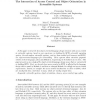Free Online Productivity Tools
i2Speak
i2Symbol
i2OCR
iTex2Img
iWeb2Print
iWeb2Shot
i2Type
iPdf2Split
iPdf2Merge
i2Bopomofo
i2Arabic
i2Style
i2Image
i2PDF
iLatex2Rtf
Sci2ools
132
click to vote
TOOLS
1998
IEEE
1998
IEEE
The Interaction of Access Control and Object-Orientation in Extensible Systems
In this paper we describe how object-oriented language design interacts with access control in extensible systems, based on our experience in building the SPIN extensible operating system. Several modern extensible systems, such as Java-enabled web browsers and SPIN, use object-oriented languages for extensibility. These systems allow extension programs written in their languages Java and Modula-3, respectively to be linked in at run time. This paper presents a case study of the object-oriented language design issues that we encountered in building SPIN. First, we describe how access control in SPIN is a ected by the language design choices made in Modula-3, and how we changed Modula-3 to satisfy our access control requirements. Second, we compare the access control mechanisms we chose in SPIN, which are mostly link-time, with those in Java, which are mostly compile-time.
Access Control | Object-oriented Language | Object-oriented Language Design | Programming Languages | TOOLS 1998 |
Related Content
| Added | 05 Aug 2010 |
| Updated | 05 Aug 2010 |
| Type | Conference |
| Year | 1998 |
| Where | TOOLS |
| Authors | Wilson C. Hsieh, Przemyslaw Pardyak, Marc E. Fiuczynski, C. Garrett, Brian N. Bershad |
Comments (0)

